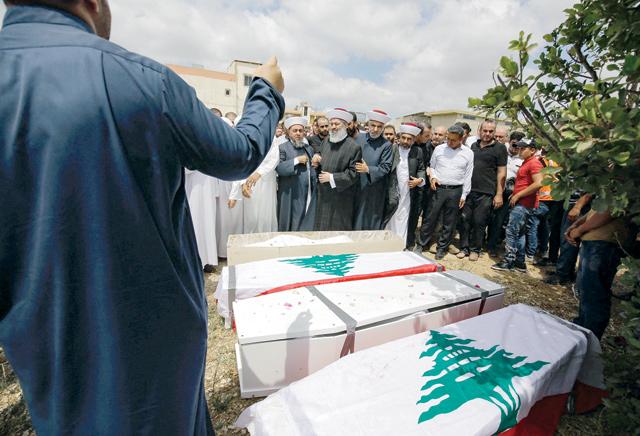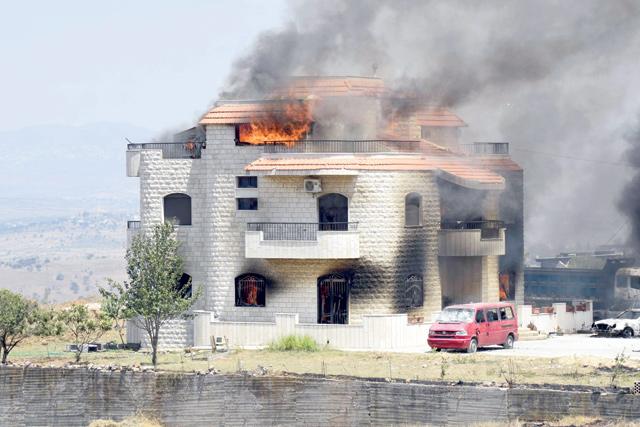You are here
Lebanon buries victims of fuel tank blast
By AFP - Aug 19,2021 - Last updated at Aug 19,2021

Prayers are recited upon the coffins of a fuel tank explosion that occurred last week in Al Tleil in Lebanon's Akkar region, during the funeral of four members of the Shteiteh family in the village of Al Daouseh, on Wednesday (AFP photo)
AL-DAOUSEH, Lebanon — Families laid to rest Wednesday victims of a fuel tank blast that killed at least 28 people in northern Lebanon amid anger and sorrow over the crisis-hit country's latest tragedy.
The explosion on Sunday in Al Tleil in the Akkar region scorched crowds clamouring for petrol that the army was distributing in light of severe fuel shortages that have paralysed a country also beset by medicine, gas and bread shortages.
The victims included soldiers and Akkar residents who darted to Al Tleil after midnight to fill gasoline in plastic containers straight from a fuel tank that exploded in circumstances that remain unclear.
The tank was among supplies confiscated by the military, which has lately wrested supplies from alleged fuel hoarders across the country.
The disaster came on top of an economic crisis branded by the World Bank as one of the world's worst in modern times and follows an explosion of poorly stored fertiliser at Beirut Port last summer that killed more than 200 people.
Akkar, one of Lebanon's poorest regions, buried several blast victims on Wednesday, according to an AFP correspondent.
The village of Al-Daouseh held funerals for four of its dead, all of whom are from the Shraytih family.
"They died for petrol, if we had fuel this would have never happened," said Mouin Shraytih who was burying two sons, one 16 and the other 20.
"Political leaders and officials should consider what it is like to have two young boys and find them burned and charred in front of your own eyes," the man in his fifties told AFP at the funeral.
Corpses from the tanker blast had been identified in and transported from hospitals hit by power and telecom outages, with even landlines disrupted.
'Deprivation'
Dozens had gathered at the family's home when a convoy of vehicles carrying the corpses arrived from a nearby hospital, an AFP correspondent said.
Shots were fired into the air as residents threw rice and flowers over the coffins.
Fawaz Shraytih, a relative of Mouin, was burying two brothers, both army soldiers.
“What happened is because of deprivation, Akkar is a deprived region,” he said.
But “all we do is pay with our blood,” he added, explaining that soldiers make up the bulk of Al Daouseh’s male population.
There are eight soldiers among his own immediate family, he said.
Nearly 80 people were injured in the blast, medics said, many with burns that further overwhelmed hospitals struggling to function without electricity.
Foreign countries and UN agencies have scrambled emergency aid to help exhausted health workers cope with the new influx of serious injuries and run DNA tests to identify charred remains.
A plane was due to arrive in Lebanon on Wednesday to evacuate severe burns victims to Turkey, the official National News Agency said.
Lebanon, a country of more than six million, is grappling with soaring poverty rates, with 78 per cent of the population living below the poverty line, according to the United Nations.
The Lebanese pound has lost 90 per cent of its black market value against the dollar while food prices have shot up by up to 400 per cent.
The country braced for higher inflation rates after central bank governor Riad Salameh said last week that the lender can no longer afford fuel subsidies.
Despite the spiralling crisis, bitterly divided leaders have yet to agree on a new Cabinet a year after the previous one resigned in the wake of the Beirut blast.
Related Articles
BEIRUT — Hospitals in the Akkar region of north Lebanon where a fuel tank explosion killed at least 28 people this week struggled to operate
BEIRUT — A fuel tank blast in Lebanon early on Sunday killed 28 people and injured nearly 80, authorities and medics said, burning a crowd c
BEIRUT — Lebanon reeled Monday from a deadly explosion that burned alive people desperate to fill plastic containers with fuel in a country














